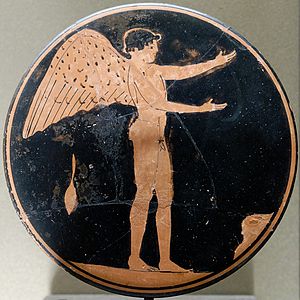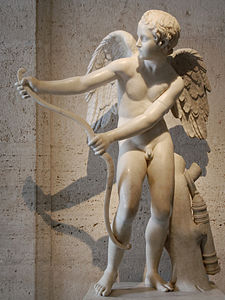Eros

 Clash Royale CLAN TAG#URR8PPP
Clash Royale CLAN TAG#URR8PPP
| Eros | |
|---|---|
| God of Sensual Love and Desire | |
 The Eros Farnese, a Pompeiian marble thought to be a copy of the colossal Eros of Thespiae by Praxiteles[1] | |
| Abode | Mount Olympus |
| Symbol | Bow, Arrows, Candles, Hearts, Wings and Kisses |
| Personal information | |
| Consort | Psyche |
| Children | Hedone |
| Parents | Ares and Aphrodite |
| Siblings | Harmonia, Phobos, Deimos, Adrestia, Anteros, Golgos and Beroe |
| Roman equivalent | Cupid |
| Part of a series on | ||||||
| Ancient Greek religion | ||||||
|---|---|---|---|---|---|---|
 | ||||||
Features
| ||||||
Godheads
| ||||||
Ethics
| ||||||
Practices
| ||||||
Sacred places
| ||||||
Texts
| ||||||
History
| ||||||
In Greek mythology, Eros (UK: /ˈɪərɒs, ˈɛrɒs/, US: /ˈɛrɒs, ˈɛroʊs/;[2]Greek: Ἔρως, "Desire") is the Greek god of sensual love and desire. His Roman counterpart was Cupid[3] ("desire"). Some myths make him a primordial god, while in other myths, he is the son of Aphrodite. He is one of the winged love gods, Erotes.
Contents
1 Etymology
2 Cult and depiction
3 Primordial god
4 Son of Aphrodite and Ares
5 Eros and Psyche
6 Eros in art
7 See also
8 Notes
9 References
10 External links
Etymology
The Greek ἔρως, meaning "desire," comes from ἔραμαι "to desire, love", of uncertain etymology. R. S. P. Beekes has suggested a Pre-Greek origin.[4]
Cult and depiction
Eros appears in ancient Greek sources under several different guises. In the earliest sources (the cosmogonies, the earliest philosophers, and texts referring to the mystery religions), he is one of the primordial gods involved in the coming into being of the cosmos. But in later sources, Eros is represented as the son of Aphrodite, whose mischievous interventions in the affairs of gods and mortals cause bonds of love to form, often illicitly. Ultimately, in the later satirical poets, he is represented as a blindfolded child, the precursor to the chubby Renaissance Cupid, whereas in early Greek poetry and art, Eros was depicted as an adult male who embodies sexual power, and a profound artist.[5][6]
A cult of Eros existed in pre-classical Greece, but it was much less important than that of Aphrodite. However, in late antiquity, Eros was worshiped by a fertility cult in Thespiae. In Athens, he shared a very popular cult with Aphrodite, and the fourth day of every month was sacred to him (also shared by Herakles, Hermes and Aphrodite).[7]
Primordial god
According to Hesiod's Theogony (c. 700 BC), one of the most ancient of all Greek sources, Eros (the god of love) was the fourth god to come into existence, coming after Chaos, Gaia (the Earth), and Tartarus (the abyss).[8]
Homer does not mention Eros. However, Parmenides (c. 400 BC), one of the pre-Socratic philosophers, makes Eros the first of all the gods to come into existence.[9]
The Orphic and Eleusinian Mysteries featured Eros as a very original god, but not quite primordial, since he was the child of Night (Nyx).[5]Aristophanes (c. 400 BC), influenced by Orphism, relates the birth of Eros:
"At the beginning there was only Chaos, Night (Nyx), Darkness (Erebus), and the Abyss (Tartarus). Earth, the Air and Heaven had no existence. Firstly, blackwinged Night laid a germless egg in the bosom of the infinite deeps of Darkness, and from this, after the revolution of long ages, sprang the graceful Love (Eros) with his glittering golden wings, swift as the whirlwinds of the tempest. He mated in the deep Abyss with dark Chaos, winged like himself, and thus hatched forth our race, which was the first to see the light."[10]
Son of Aphrodite and Ares
In later myths, he was the son of the deities Aphrodite and Ares: it is the Eros of these later myths who is one of the erotes. Eros was associated with athleticism, with statues erected in gymnasia,[11][verification needed] and "was often regarded as the protector of homosexual love between men."[11][verification needed] Eros was depicted as often carrying a lyre or bow and arrow. He was also depicted accompanied by dolphins, flutes, roosters, roses, and torches.[11][verification needed]
[Hera addresses Athena:] “We must have a word with Aphrodite. Let us go together and ask her to persuade her boy [Eros], if that is possible, to loose an arrow at Aeetes’ daughter, Medea of the many spells, and make her fall in love with Jason . . .” (Apollonius of Rhodes, Argonautica 3. 25 ff – a Greek epic of the 3rd century BC)
"He [Eros] smites maids’ breasts with unknown heat, and bids the very gods leave heaven and dwell on earth in borrowed forms." (Seneca, Phaedra 290 ff.)
"Once, when Venus’ son [Eros] was kissing her, his quiver dangling down, a jutting arrow, unbeknown, had grazed her breast. She pushed the boy away. In fact the wound was deeper than it seemed, though unperceived at first. [And she became] enraptured by the beauty of a man [Adonis]." (Ovid, Metamorphoses 10. 525 ff.)
"Eros drove Dionysos mad for the girl [Aura] with the delicious wound of his arrow, then curving his wings flew lightly to Olympus. And the god roamed over the hills scourged with a greater fire.” (Nonnus, Dionysiaca 48. 470 ff – a Greek epic of the 5th century AD)
Eros and Psyche
The story of Eros and Psyche has a longstanding tradition as a folktale of the ancient Greco-Roman world long before it was committed to literature in Apuleius' Latin novel, The Golden Ass. The novel itself is written in a picaresque Roman style, yet Psyche retains her Greek name. Eros and Aphrodite are called by their Latin names (Cupid and Venus), and Cupid is depicted as a young adult, rather than a child.[12]
The story tells of the struggle for love and trust between Eros and Psyche. Aphrodite was jealous of the beauty of mortal princess Psyche, as men were leaving her altars barren to worship a mere human woman instead, and so she commanded her son Eros, the god of love, to cause Psyche to fall in love with the ugliest creature on earth. But instead, Eros falls in love with Psyche himself and spirits her away to his home. Their fragile peace is ruined by a visit from Psyche's jealous sisters, who cause Psyche to betray the trust of her husband. Wounded, Eros leaves his wife, and Psyche wanders the Earth, looking for her lost love. Eventually she approaches Aphrodite and asks for her help. Aphrodite imposes a series of difficult tasks on Psyche, which she is able to achieve by means of supernatural assistance.
After successfully completing these tasks, Aphrodite relents and Psyche becomes immortal to live alongside her husband Eros. Together they had a daughter, Voluptas or Hedone (meaning physical pleasure, bliss).
In Greek mythology, Psyche was the deification of the human soul. She was portrayed in ancient mosaics as a goddess with butterfly wings (because psyche was also the Ancient Greek word for 'butterfly'). The Greek word psyche literally means "soul, spirit, breath, life or animating force".
Eros in art

Eros depicted as an adult male, Attic red-figure bobbin (c. 470–450 BC)

A Red-Figure Plate with Eros as a youth making an offering. (c. 340-320 BC) Walters Art Museum, Baltimore

This Roman Eros once rode a dolphin, a common convention for 1st century AD depictions of the deity. Walters Art Museum, Baltimore.

Eros Stringing his Bow, second-century AD Roman copy from the Capitoline Museum of a Greek original by Lysippos

Psyche Revived by Cupid's Kiss (1787–1793) by Antonio Canova.
See also
- Ares
- Eros (concept)
- Erotes
- Greek words for love
- Hermaphroditus
- Kamadeva
- Mara (demon)
- Love at first sight
- Phanes (mythology)
Notes
^ A. Corso, Concerning the catalogue of Praxiteles' exhibition held in the Louvre. Conference paper presented at ИНДОЕВРОПЕЙСКОЕ ЯЗЫКОЗНАНИЕ И КЛАССИЧЕСКАЯ ФИЛОЛОГИЯ – 11 June 2007; p. 159
^ Oxford Learner's Dictionaries: "Eros"
^ Larousse Desk Reference Encyclopedia, The Book People, Haydock, 1995, p. 215.
^ R. S. P. Beekes, Etymological Dictionary of Greek, Brill, 2009, p. 449.
^ ab See the article Eros at the Theoi Project.
^ "Eros", in S. Hornblower and A. Spawforth, eds., The Oxford Classical Dictionary.
^ Mikalson, Jon D. (2015). The Sacred and Civil Calendar of the Athenian Year. Princeton University Press. p. 186. ISBN 9781400870325..mw-parser-output cite.citationfont-style:inherit.mw-parser-output qquotes:"""""""'""'".mw-parser-output code.cs1-codecolor:inherit;background:inherit;border:inherit;padding:inherit.mw-parser-output .cs1-lock-free abackground:url("//upload.wikimedia.org/wikipedia/commons/thumb/6/65/Lock-green.svg/9px-Lock-green.svg.png")no-repeat;background-position:right .1em center.mw-parser-output .cs1-lock-limited a,.mw-parser-output .cs1-lock-registration abackground:url("//upload.wikimedia.org/wikipedia/commons/thumb/d/d6/Lock-gray-alt-2.svg/9px-Lock-gray-alt-2.svg.png")no-repeat;background-position:right .1em center.mw-parser-output .cs1-lock-subscription abackground:url("//upload.wikimedia.org/wikipedia/commons/thumb/a/aa/Lock-red-alt-2.svg/9px-Lock-red-alt-2.svg.png")no-repeat;background-position:right .1em center.mw-parser-output .cs1-subscription,.mw-parser-output .cs1-registrationcolor:#555.mw-parser-output .cs1-subscription span,.mw-parser-output .cs1-registration spanborder-bottom:1px dotted;cursor:help.mw-parser-output .cs1-hidden-errordisplay:none;font-size:100%.mw-parser-output .cs1-visible-errorfont-size:100%.mw-parser-output .cs1-subscription,.mw-parser-output .cs1-registration,.mw-parser-output .cs1-formatfont-size:95%.mw-parser-output .cs1-kern-left,.mw-parser-output .cs1-kern-wl-leftpadding-left:0.2em.mw-parser-output .cs1-kern-right,.mw-parser-output .cs1-kern-wl-rightpadding-right:0.2em
^ Hesiod. Theogony, 116–122
^ "First of all the gods she devised Erōs." (Parmenides, fragment 13.) (The identity of the "she" is unclear, as Parmenides' work has survived only in fragments.
^ Aristophanes, Birds, lines 690–699. (Translation by Eugene O'Neill, Jr., Perseus Digital Library; translation modified.)
^ abc Conner, p. 132, "Eros"
^ Apuleius, The Golden Ass (Penguin Classics).
References
Hesiod, The Homeric Hymns and Homerica with an English Translation by Hugh G. Evelyn-White, Cambridge, MA.,Harvard University Press; London, William Heinemann Ltd. 1914. Online version at the Perseus Digital Library.
Smith, William; Dictionary of Greek and Roman Biography and Mythology, London (1873). "Eros"
External links
| Wikimedia Commons has media related to Eros. |
- Warburg Institute Iconographic Database (ca 2,400 images of Eros)




